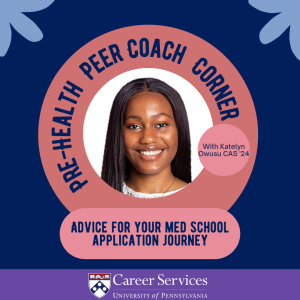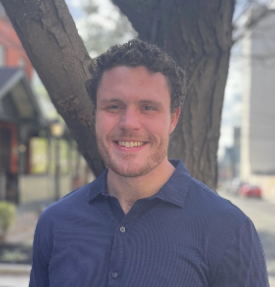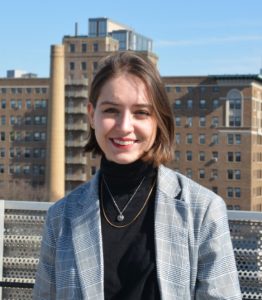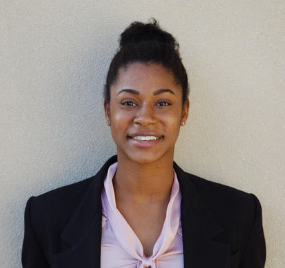
Welcome back to the Pre-Health Peer Coach Corner where we share tips, tricks, and advice for being Pre-Health at Penn. This series has come so quickly to an end and I’d like to thank our contributors for their advice but also to all of you that have tuned in. For our last post in this series, we’re going to talk about what comes AFTER you submit your main application…
Meet the Panel: Darrian McAfee CAS ’21, Luis Rosario CAS ’19 and Heta Patel CAS ’21

Hi there! My name is Benjamin Padon, and I graduated from Penn in the class of 2021 with a major in Neuroscience and minors in Chemistry and Healthcare Management. While at Penn, I played on the football team and did research in the school of medicine. Since graduating, I’ve been living at home in Houston and doing research at Texas Children’s Hospital. I’m currently undecided on which medical school to attend in the fall, but will be making the decision soon!

My name is Eve Frangopoulos. I am a graduate of the class of 2020 and am currently studying medicine at SUNY Downstate. During my undergraduate career, I majored in Biology and minored in Gender & Sexuality Studies. During my gap year, I worked in the Pharmaceutical industry conducting clinical research.
 Hi! My name is Taylor Cooper, and I’m a current M1 at Dartmouth’s Geisel School of Medicine! I graduated from Penn in 2019 where I majored in HSOC and minored in Chemistry. During my time at Penn, I was on the women’s volleyball team and enjoyed working with and partnering with the local Philly community through non-profit organizations like Classroom Champions! Before starting medical school, l lived and worked in Denver, CO as a strategy and operations senior analyst for a large healthcare company. When I’m not studying, you can probably find me working with Geisel’s Urban Health Scholars, practicing yoga, or hiking one of the many trails in northern New England!
Hi! My name is Taylor Cooper, and I’m a current M1 at Dartmouth’s Geisel School of Medicine! I graduated from Penn in 2019 where I majored in HSOC and minored in Chemistry. During my time at Penn, I was on the women’s volleyball team and enjoyed working with and partnering with the local Philly community through non-profit organizations like Classroom Champions! Before starting medical school, l lived and worked in Denver, CO as a strategy and operations senior analyst for a large healthcare company. When I’m not studying, you can probably find me working with Geisel’s Urban Health Scholars, practicing yoga, or hiking one of the many trails in northern New England!
 Hi! I’m Heta Patel and I’m a 1st year Penn Med student. I graduated from Penn undergrad in 2021 with a Health & Societies major and Hispanic Studies minor and went straight through to medical school. I am passionate about violence prevention, and the medical humanities, and more often than not you can find me collecting vinyl and frequenting music shows around Philadelphia.
Hi! I’m Heta Patel and I’m a 1st year Penn Med student. I graduated from Penn undergrad in 2021 with a Health & Societies major and Hispanic Studies minor and went straight through to medical school. I am passionate about violence prevention, and the medical humanities, and more often than not you can find me collecting vinyl and frequenting music shows around Philadelphia.
When did your secondaries start to arrive?
Ben Padon: I submitted my primary around the second week of June, so I probably started getting secondaries in the second half of the summer, July, or August if I had to give you time a window.
Eve Frangopoulos: I think I remember them arriving as early as the beginning of August.
Taylor Cooper: I started receiving my secondaries in early July.
Heta Patel: My secondaries started arriving at the end of July, or the beginning of August.
How did you manage your time in completing the secondaries?
Ben Padon: Lucky, for me, I had chosen to take a gap year right, so I had a good amount of leeway to work on my essays. But like I said I think with anything it’s all about time management and not letting it all pile up because then you start getting burnt out and you might submit something that might not be up to the standards that you would have normally held it to had you been less anxious or stressed.
Eve Frangopoulos: Well, it was honestly a little bit of a struggle for me, I had to remember that other students recommended to me that I started drafting secondaries before they were officially sent out to me and I tried doing that, but I think because I graduated during the pandemic and I was also working, it was a little difficult to spend the time pre-drafting secondaries when I had so much else going on. That was probably one of the pieces of advice I should have listened to. In my excel sheet, I listed all of my secondaries that I had to get done and it ended up being a race to the finish line. I wanted to get them in early enough but I also really wanted to make sure that every secondary was tailored to each school. And so, as a consequence of that, I was writing a lot and spending a lot of my day writing and basically fighting deadlines.
Taylor Cooper: I was still working full time [by the time my secondaries started arriving] but we had transitioned to remote work and so, because of the pandemic. I would wake up early (around 5:00) in the morning and work on my secondary applications before the start of the workday and return to them in the evenings. My goal was to complete each of my secondaries within two weeks of receiving them. This made for a long month of July and early August, but then I was done. I tried to build in small things to make the process a bit more enjoyable like going for a hike as a break and working on my applications outside or at different coffee shops.
Heta Patel: Huge huge piece of advice is to pre-write your secondaries. Between your submission for the primary and when your secondaries start coming in, you’ll have some time, about a month or so. During that time, look at the common questions for those schools as they usually don’t change from year to year, and at least try to answer the main ones which come up a lot.
What was one of the most common secondary questions you received?
Ben Padon: I got a lot of “Why our school?” and “Why do you want to be a physician?” There were also a good amount of questions that asked about diversity and of course, most applications had a question asking “What did you do during COVID?” and “How did that affect your plans, if at all?” Certain schools that are more focused on say you know primary care might ask you to elaborate on that, or you might be asked what kind of specialty are you looking to do.
Eve Frangopoulos: I don’t really remember the questions I just remember that there were parts about myself that I always wanted to convey to medical schools> For example how passionate I was about health equity and that in college, I did certain types of activities that I wanted to continue to do in medical school and how the medical schools’ values aligned with my own.
Taylor Cooper: There were a few themes that were really common. Some of them included: “tell us more about you or a story about yourself” and “tell us about a time that you had to overcome something or persevere.” “Why us?” and “why our school?” was another common theme I came across. A very helpful piece of advice that I received for the “Why us?” question was to think about why the school is a good fit for you just as much as you think about why you are a good fit for the school. This could be achieved by talking about certain programs and interest groups, as well as what you hope to be able to achieve by being part of those programs.
Heta Patel: I got a lot of questions about diversity, I was also asked “What do you bring to the table that’s unique?” and “Why our school?”
How did you prepare for the CASPer and other situational judgment tests?
Ben Padon: If I’m being honest the most preparation I did was taking the practice one. It’s just a test of how you would handle a social situation. There’s no real right or wrong answer, I think that the most important thing is being able to talk through your thought process in a logical and concise manner. They want to see that you can think critically, they want to see that you can think on the fly and that you can communicate that thought process. In some situations, there’s maybe a more empathetic versus a more calculated option, and there’s not necessarily a right answer, like I said, they may just want to see how you think. I think it’s a really hard test to prepare for, it’s something that you just kind of have to do. But familiarizing yourself with the structure of the assessment by taking a practice one I think is important because it’s hard to prepare for the actual content.
Eve Frangopoulos: I mostly prepared by using the examples that Casper provided online and searched online for common ethical scenarios then thought of what my answer would be. I used a lot of my own morality to answer the questions and it worked out, I would say.
Taylor Cooper: A friend sent me a podcast that explained what Casper is and what to expect which I listened to, and then I tried the practice Casper. I also would just try thinking through how I would approach certain situations.
Heta Patel: There are these YouTube videos, look up BeMo, they have a bunch of Casper test preparation videos. In addition to that, I also used the sample tests you get when you register for the test. So I did one, in the beginning, just to get an idea of what the test was and then I would watch those videos to learn a little bit more about Casper, and then I did the other practice tests as practice. I would tell people to not stress too much about this just make sure that you are familiar with what the test entails. At the end of the day, Casper is not a test that can be studied for, just trust that you’re a normal ethical person so you’re not going to make a mistake or fail.
Do you have any final pieces of advice?
Eve Frangopoulos: With regard to your secondaries, I think it’s important to know what makes you special and what makes you stand out and incorporate that in your secondaries and in your application. A lot of what we do is very similar to one another, but everybody has something that makes them unique and you should not be afraid to capitalize on that and get that point across to schools. That’s also why I think the writing pieces are so incredibly important, and you should spend a lot of time on them because if you’re able to convey what makes you special it will definitely make you stand out.
Taylor Cooper: Something that was very helpful for me was tapping into the resources that Penn has. I think the Career Services office is amazing; I often had meetings with Carol Hagan, even after I graduated, to get feedback and advice. I also have a mentor at Penn who I’m still in touch with who was gracious enough to read many of my writing pieces and provide feedback. Utilize those around you because the application cycle can feel really long and having a support system around you can be a really big help.
Heta Patel: I created an excel sheet for every school to help me manage my time and remind me about deadlines. I had a list of the Medical Schools [I was applying to] along with the date I got the secondary and a deadline. If it was a school that I really wanted to go to I made sure I would make the deadlines a week away. If it was a school that I was kind of interested in going to, the deadline would be two weeks away, and then for other schools, a deadline of three weeks. This helped me figure out which ones to work on first because it’s not always the first one you get that you want to work on immediately, there are schools you would want to prioritize.




